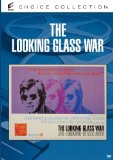| Reviews & Columns |
|
Reviews DVD TV on DVD Blu-ray 4K UHD International DVDs In Theaters Reviews by Studio Video Games Features Collector Series DVDs Easter Egg Database Interviews DVD Talk Radio Feature Articles Columns Anime Talk DVD Savant Horror DVDs The M.O.D. Squad Art House HD Talk Silent DVD
|
DVD Talk Forum |
|
|
| Resources |
|
DVD Price Search Customer Service #'s RCE Info Links |
|
Columns
|
|
|
Looking Glass War (Sony Choice Collection), The
Interesting in fits and starts...but ultimately flawed (and fairly obvious, by the end). Sony's Choice Collection vault of hard-to-find cult and library titles has released The Looking Glass War, Columbia's 1969 hippie spy film based on the novel by John Le Carré, and starring flavors-of-the-month Christopher Jones and Pia Degermark, along with a dream cast of U.K. pros: Ralph Richardson, Paul Rogers, Anthony Hopkins, Ray McAnally, Robert Urquhart, Susan George, Anna Massey, Vivian Pickles, and Timothy West. No extras for this smashing-looking widescreen transfer.
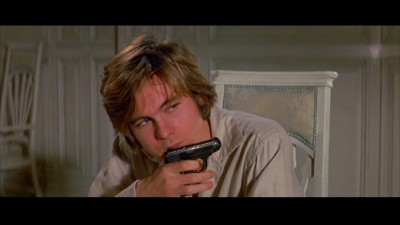
Two-bit British agent Taylor (Timothy West), after securing a vital roll of reconnaissance film he obtained via a West German airline pilot, is run over by a truck on his snowy walk back to his hotel. The unseen driver searches Taylor, but the roll of film has blown away in the snow. Enter "Department" head, LeClerc (Ralph Richardson), who makes the decision to return to WWII SOP and train a man to go undercover into East Germany to secure more photographs from Fritsche (Guy Deghy). Photos purchased from Fritsche may indicate Soviet rockets only 700 miles from London, and LeClerc needs eyes on the ground to confirm. Despite reluctance from his superior, the Undersecretary (Ray McAnally), LeClerc is given the go-ahead. Recruiting a Polish sailor, Leiser (Christopher Jones), who jumped ship in London to see the mother of his baby, Susan (Susan George), LeClerc and his second, Haldane (Paul Rogers), decide to train the novice in exchange for citizenship. Agent John Avery (Anthony Hopkins) is in charge of the training, and soon he's helping the cocky, willful Leiser under the East German barbed wire. Almost immediately, however, Leiser is compromised (he foolishly kills a border guard), and he desperately tries to reach Fritsche...before running into "The Girl" (Pia Degermark).
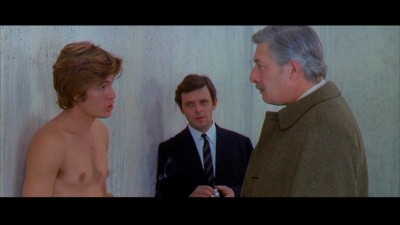
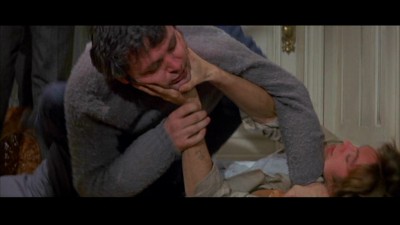
I haven't seen The Looking Glass War in years and years (having trouble sleeping? Buy this book...), and I was hoping older eyes might find some subtleties or connections I missed the last time I wrote about it 15 years ago. No such luck. Written and directed by Frank R. Pierson―a far better writer (Cat Ballou, Cool Hand Luke, The Anderson Tapes, Dog Day Afternoon) than a director (King of the Gypsies, Babs' A Star is Born)―The Looking Glass War has a few intriguing ideas and one or two suspenseful set-pieces, but it never comes together. Deviating fatally from the source novel, Pierson jettisons the novel's central conflict―the lowly military intelligence subsection, "The Department," trying to compete with Control's and George Smiley's more advanced, better-funded "The Circus"―while drastically altering the protagonist Leiser from a former Polish operative during WWII, to a disaffected, bored novice who hates Germans and who thinks it will be a "new experience" to be a spy.
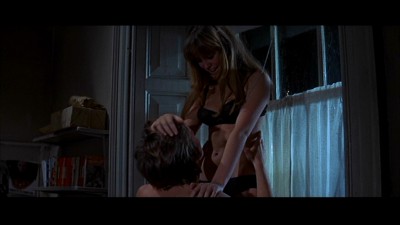
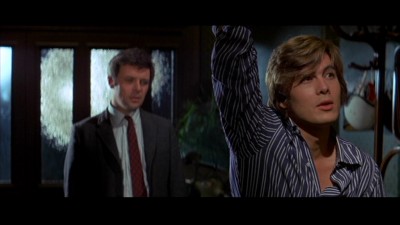
Now, had Pierson gone more deeply into that particular vein and mined some sort of commentary on the vague, unformed, even-by-1969 clichéd political notions of the counter-culture―contrasted by Hopkins' equally naive belief in the essential goodness of the patriotism of his intelligence job―The Looking Glass War might have been ahead of its time. Instead, Pierson goes all squishy, focusing too much time on Jones' "Pepsi Generation" romantic assignations with Susan George and especially Pia Degermark (their desperately beautiful lakeside tryst plays like one of those late 60s FDS/douche TV commercials), while forgetting to create a believable reason why Jones would agree to this obviously foolhardy mission in the first place (it's not enough to say it's because girlfriend George has aborted his child: he agreed to the mission before that fact). Instead, Pierson and Jones create a cipher who thinks spies are "wonderful," and who "spits" on peace...but who never makes it clear to the audience why he's particularly bothered to go into East Germany. By the movie's denouement, Pierson's clunky exposition can't even make it clear if Richardson set the whole plan up as a deliberate scam or not―something Le Carré is quite clear about in his novel. When Richardson's operation is blown, and McAnally comes out of the blue to benignly pooh-pooh his efforts, Richardson starts scrambling to CYA, and Hopkins starts jumping to conclusions about the obsolescence of Jones' radio and muttering about fathers killing their sons, and pretty soon, we're not sure what the hell just happened in the movie we watched―not in a good way, a complex, morally ambiguous, ethically convoluted Le Carré way...but in the inept, compromised way of a moviemaker straying too far from a source work to which stricter fidelity was obviously needed.
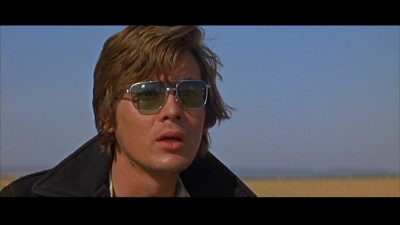
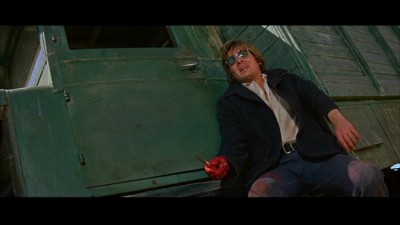
That isn't to say that The Looking Glass War doesn't have its pleasures. Jones' training sequence has a cool, strange rhythm to it (once you get past the big gaping jumps in continuity that brought Richardson and Hopkins to Jones in the first place), highlighted by a balls-out fistfight between Hopkins and Jones that is as exciting as it is largely unexplained within the context of the narrative (yes, I know Rogers has been instructed by Richardson to "forge" Jones, but what good would it have done "The Department" if either Jones or Hopkins had been killed in this vicious, no-holds-barred fight?). Once Jones crosses the border into East Germany, Pierson does a good job of ratcheting up the suspense, particularly when Jones kills both the border guard (that knife doesn't pull out easily, does it?) and the homosexual truck driver (a beautifully directed sequence that shows the absolute terror and moral queasiness of amateur Jones realizing he's in way over his head...and doomed). Unfortunately, this nicely worked-out suspense is continuously ruined by dropping in an absolutely god-awful upbeat, bouncy cocktail lounge score by Wally Stout (Angela Morley), utterly defeating the gorgeous but vaguely unsettling, sinister frames by cinematographer Austin Dempster (Bedazzled, Otley).
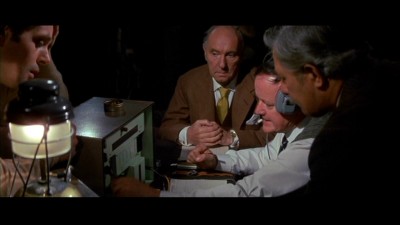
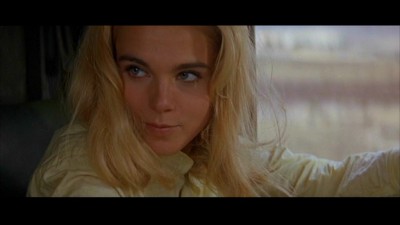
Not exactly helping matters, either, is the central vacuum left by Jones (and to a lesser extent, Degermark). Clearly, the best part of The Looking Glass War is the U.K. cast. Richardson is wonderfully controlled as the aging spy master who bemusedly says he's ashamed he can't remember the names of all the young men he sent to death during WWII, while Hopkins is just right as the uptight (has he ever been anything else?) middleman who really wants to believe in what he's doing...because he has nothing else (Timothy West, a favorite supporting player, scores in the movie's first scene as the scruffy, sloppy agent who's not aware of how badly he's slipped until it's too late). One can't come down too hard on Elvira Madigan's Degermark because her completely unbelievable character floats into the movie without a trace of motivation, immediately risks her life for Jones after glancing at him once (he's passed out), and then falls in love with him―all without the slightest set-up in Pierson's script. She isn't asked to do anything here except look beautiful, and she does that quite well. Equally beautiful Jones, however, is expected to carry the movie, and his brand of lazy-eyed diffusion doesn't suggest Method as much as fugue state (apparently, rigidly trained Hopkins despised him...as did David Lean on Jones' follow-up and final hurrah, Ryan's Daughter). Whether it was a matter of Pierson not being able to corral him properly (which would jibe with accounts of Jones' behavior on other sets), or Pierson actually seeking this kind of disaffected, blank performance, is beside the point. Ultimately, it just doesn't work here because, irritating and frustrating as Jones' turn is at times, it's symptomatic of The Looking Glass War itself: fuzzy, careless, disjointed, and ineffectual.
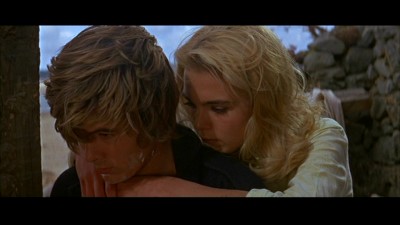
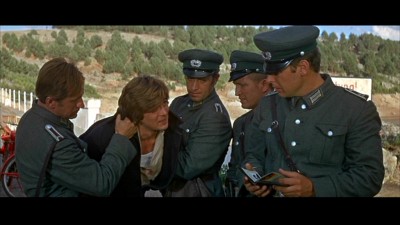
The DVD:
The Video:
One of the best transfers I've seen for a Sony Choice Collection. The anamorphically enhanced, 2.35:1 widescreen image is razor sharp, with minimal grain and beautifully modulated color values.
The Audio:
The Dolby Digital English mono audio track is just fine, with a full re-recording level, little hiss and no fluctuation, as well as a welcome closed-captioning option.
The Extras:
No extras for The Looking Glass War.
Final Thoughts:
A missed opportunity with that supporting cast. Even as early as 1969, the notion of crass, calculating, soulless spy games was becoming mundane in movies (if not outright clichéd), so The Looking Glass War's failure to make such routine material even plausible is a fatal mistake. Casting zoned-out Christopher Jones with beauty Pia Degermark made for pretty pictures, but director Frank R. Pierson's insistence on shooting the last half of this already vague, fuzzy spy flick as a Prince Matchabelli Windsong commercial, sinks whatever few pleasures there were here. They should have stuck with the book. A rental for spy fan completists is all I can give the spectacular-looking The Looking Glass War.
Paul Mavis is an internationally published film and television historian, a member of the Online Film Critics Society, and the author of The Espionage Filmography.


|
| Popular Reviews |
| Sponsored Links |
|
|
| Sponsored Links |
|
|
| Release List | Reviews | Shop | Newsletter | Forum | DVD Giveaways | Blu-Ray | Advertise |
|
Copyright 2024 DVDTalk.com All Rights Reserved. Legal Info, Privacy Policy, Terms of Use,
Manage Preferences,
Your Privacy Choices | |||||||









